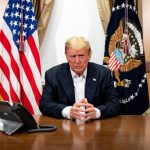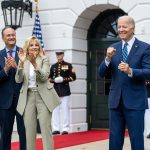In a significant shake-up prior to the commencement of his next administration, President-elect Donald Trump has named David Warrington to the crucial role of White House Counsel, while moving William McGinley to the newly formed Department of Government Efficiency (affectionately dubbed DOGE). This recent rearrangement comes after a fair share of internal drama, which has spilled over into the public arena, showcasing the ever-colorful dynamics among Trump’s closest advisors.
The appointment of Warrington is particularly noteworthy, both for his background and for the implications it has for other players within Trump’s inner circle. Known for his conservative credentials and military service, Warrington has served as Trump’s attorney throughout his campaign, a role definitely not for the faint of heart. In contrast, McGinley, who was originally favored for the White House Counsel position by advisor Boris Epshteyn, has found himself reassigned amid swirling speculation and intrigue regarding Epshteyn’s influence and ambitious maneuvers.
“After Internal Drama, Trump Names New Pick for White House Counsel”
Holy smokes there's a lot of 'palace intrigue' and moving parts to unpack here. Details from @jenvanlaar.https://t.co/3rIermNg5G— Gray Wolf (@graywolf442) December 10, 2024
Warrington’s ascension seems to symbolize a broader realignment of power within Trump’s team. It appears that Epshteyn’s push to get McGinley the coveted position backfired spectacularly. This development could signal a major setback for Epshteyn, whose credibility has been called into question following allegations of trying to leverage his connections for personal gain, an act that could endanger the integrity of Trump’s team. This move could also reflect the increasing might of Trump’s incoming Chief of Staff, Susie Wiles, who has apparently championed Warrington from the outset.
The intrigue doesn’t stop there. An investigation led by Warrington surfaced allegations of Epshteyn pursuing lucrative consulting contracts from political and business figures while simultaneously advising Trump on campaign matters. Such internal conflicts are par for the course when maneuvering through the tricky realm of political alliances, but the implications here could be extensive. The key takeaway? This is a giant warning flag against favoritism and opportunism—a reflection of the potential chaos that could ensue if personal egos take precedence over the country’s interests.
Trump, who has made it abundantly clear that he will not tolerate such behavior from his staff, mentioned that his administration is about putting the American people first, not enriching individuals under the guise of governance. The reassignment of McGinley to DOGE, despite its potentially powerful role, can still be viewed through a lens of caution. After all, with personalities like Elon Musk involved, the atmosphere will be anything but dull, and it remains to be seen how McGinley will navigate his new terrain.
One thing is for sure: the upcoming months are bound to be filled with a delightful mixture of political shenanigans and power plays. As Trump gears up for his administration’s second term, the emphasis must be on establishing a stable and effective government that truly serves the American people. With power dynamics constantly shifting, the hope is that the new team of leaders can bring about effective governance rather than turning Washington into a circus of individuals more focused on personal agendas than on the national good.




